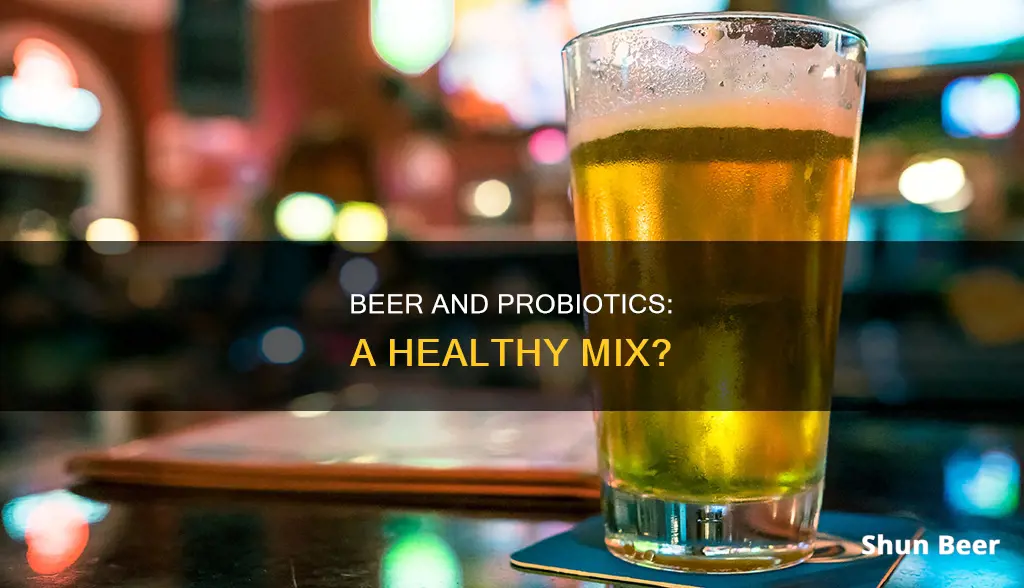
Probiotics are living bacteria that support digestive health, reduce inflammation, boost the immune system, and aid digestion. Alcohol, on the other hand, is known to irritate the gut lining, increase acid production, and alter the balance of gut flora. So, what happens when you mix the two? Is it safe to drink a beer after taking a probiotic?
| Characteristics | Values |
|---|---|
| Can I drink alcohol while taking probiotics? | Yes, but alcohol may kill the good bacteria in your gut and the probiotic bacteria in your supplements. |
| How long after taking probiotics can I drink alcohol? | It is recommended to wait 4-6 hours after taking probiotics before drinking alcohol. |
| What type of alcohol is best for gut bacteria? | Ideally, no alcohol is best for gut bacteria. However, red wine contains polyphenols, which have antioxidant and anti-inflammatory properties that are beneficial for gut health. |
| How does alcohol consumption impact the good bacteria in the gut? | Alcohol can overwhelm the gastrointestinal tract, killing many beneficial bacteria in the intestines and leading to an imbalance in the gut microbiome. |
| What are the effects of taking probiotics and alcohol together? | Probiotics can help protect the gut from alcohol-induced damage and reduce negative symptoms such as nausea, vomiting, diarrhea, and abdominal pain. Probiotics may also improve liver function in heavy drinkers. |
What You'll Learn
- Beer and probiotics can be consumed together, but it is counterproductive
- Excess alcohol can kill gut bacteria and probiotics
- Probiotics can help protect the gut from alcohol-induced damage
- Alcohol is toxic to the body and negatively impacts the central nervous system
- The best time to take probiotics is in the morning or at lunchtime

Beer and probiotics can be consumed together, but it is counterproductive
Heavy alcohol consumption can overwhelm the gastrointestinal tract, killing many beneficial bacteria and allowing bad bacteria, viruses, and fungi to flourish, leading to pathogen overgrowth, also known as dysbiosis. This imbalance in gut flora can lead to digestive problems, such as diarrhoea, constipation, and irritable bowel syndrome (IBS), as well as other health issues like depression.
Additionally, alcohol interferes with the absorption of essential nutrients like B vitamins, vitamin C, and magnesium, which can lead to vitamin deficiencies. It also affects the liver, which has to work overtime to clear the toxins from alcohol, often resulting in liver damage.
The amount of alcohol consumed determines the effect on probiotics. Moderate consumption (less than one glass of alcohol per day) is unlikely to destroy all the good bacteria. However, consuming more than that can kill the beneficial bacteria in your gut flora. Therefore, it is recommended to limit alcohol consumption and choose a time for probiotic supplements that is far removed from drinking alcohol, such as taking the supplements in the morning or at lunchtime.
While beer and probiotics can be consumed together, the benefits of probiotics may be reduced due to the counterproductive effects of alcohol. To maintain gut health and maximise the benefits of probiotics, it is advisable to limit alcohol intake and prioritise a healthy diet and lifestyle.
Beer Drinking and Liver Cirrhosis: What's the Link?
You may want to see also

Excess alcohol can kill gut bacteria and probiotics
Excessive alcohol consumption can have detrimental effects on gut health and the microorganisms that reside there. The gut microbiome, a diverse community of microorganisms, plays a crucial role in maintaining overall health. It supports nutrient absorption, bolsters the immune system, regulates inflammation, and defends against toxins. However, alcohol can disrupt this delicate balance.
Firstly, alcohol can alter the composition of the gut microbiome, leading to a condition known as dysbiosis. This imbalance can result in a decrease in beneficial bacteria such as Akkermansia, Roseburia, Faecalibacterium, and Bacteroides. It can also lead to an overgrowth of opportunistic pathogens, negatively impacting your health.
Secondly, excessive alcohol consumption can increase intestinal permeability, leading to a "leaky gut." A healthy gut lining acts as a protective barrier, preventing harmful substances from entering the bloodstream. However, alcohol abuse can weaken this barrier, allowing microbes and toxins to enter the bloodstream and causing widespread inflammation.
Thirdly, alcohol can contribute to bacterial overgrowth in the small intestine. This can further exacerbate the imbalance in the gut microbiome and increase the risk of infections. Additionally, alcohol can impair the production of antimicrobial molecules in the gut, making it easier for pathogens to take hold.
Finally, alcohol can cause gastritis, as the enzymes in the stomach lining can become overwhelmed, leading to stomach pain, vomiting, and diarrhoea.
While moderate alcohol consumption may not have the same severe effects, it is still important to prioritise gut health. This can be achieved through proper hydration, consuming probiotics and prebiotics, increasing fibre intake, and getting adequate rest. By supporting the gut microbiome, you can promote overall health and well-being.
Beer and Lifting Weights: A Healthy Balance?
You may want to see also

Probiotics can help protect the gut from alcohol-induced damage
Alcohol is toxic to the body and can overwhelm the gastrointestinal tract, killing off many beneficial bacteria in the gut. This can lead to an overgrowth of harmful bacteria, viruses and fungi, known as dysbiosis, which in turn can cause inflammation in the gut.
Probiotics are good bacteria that support digestive health, reduce inflammation, boost the immune system, and aid digestion. They can help to offset some of the damage caused by alcohol consumption, reducing symptoms like nausea, vomiting, diarrhoea, and abdominal pain.
However, alcohol can also inhibit the growth of probiotics by killing them. A study found that individuals who consumed excess alcohol had reduced levels of Bifidobacteria, Lactobacilli, and Enterococci bacterial strains. Therefore, it is recommended to take a probiotic supplement several hours before consuming alcohol to allow the good bacteria to colonise the gut.
Some studies have shown that specific strains of probiotics can help to restore gut flora and improve liver enzymes in alcohol-induced liver injury. For example, Bifidobacterium bifidum and Lactobacillus plantarum have been found to reduce harmful bacteria in the gut and improve the overall balance of gut flora.
In conclusion, while it may be safe to consume alcohol in moderation while taking probiotics, excessive alcohol consumption can kill off the good bacteria in the gut and reduce the efficacy of probiotic supplements. Therefore, it is important to space out alcohol consumption and probiotic supplementation and to prioritise gut health by limiting alcohol intake.
Parked, Drinking Beer: Legal or Not?
You may want to see also

Alcohol is toxic to the body and negatively impacts the central nervous system
Chronic alcohol abuse can lead to neurodegeneration, affecting cognitive function, memory, and coordination. It can cause cerebral atrophy, impair synaptic plasticity, disrupt neurotransmitters, and increase the risk of neurological disorders. Alcohol also damages the hippocampus, which is responsible for learning and memory.
In addition to its effects on the central nervous system, alcohol can cause peripheral neuropathy, where nerves in the extremities are damaged. It can alter sensory perception, leading to numbness and tingling in the limbs. It can also lead to muscle weakness and atrophy, as well as autonomic dysfunction, affecting digestion, respiration, heart rate, and metabolism.
Alcohol's toxic effects on the nervous system are widespread and can have long-term consequences. It is important to moderate alcohol consumption to maintain proper nervous system function and overall health.
Drinking Beer with a Straw: Yay or Nay?
You may want to see also

The best time to take probiotics is in the morning or at lunchtime
It is generally agreed that the best time to take probiotics is in the morning or at lunchtime. This is because stomach acid production is likely to be at its lowest in the morning, and probiotics can make it into your small and large intestines before breakfast.
Probiotics may be most effective if you take them about 30 minutes before a meal, and most effective if you take your supplement before breakfast. This is because, during a fast or prior to eating, the stomach won't be as acidic, and this will allow the probiotic capsule or tablet to make its way into the intestine.
Taking a probiotic with a larger meal may be counterintuitive. The acid within the stomach that's breaking down your meal may also excessively degrade the probiotic before it has a chance to take effect. Heavier meals, especially dinner, take longer to digest than other meals, as acid works to process food into the small intestine, naturally upping total acid interaction over time.
However, some bacterial strains are naturally more resistant to stomach acid, and can be taken with meals—in some cases, multiple times a day. You'll likely see printed language on your chosen probiotic packaging that indicates it's safe to take with meals.
Consistency is key when it comes to taking probiotics. It's best to take them at least once daily, and at the same time each day.
Beer, Valsartan, and Amlodipine: Is It Safe to Drink?
You may want to see also
Frequently asked questions
Yes, you can drink alcohol while taking probiotics. However, alcohol may harm the delicate live cultures and gut bacteria, so it is recommended to limit alcohol consumption.
It is recommended to wait at least 4-6 hours after taking probiotics before consuming alcohol. This gives the probiotic bacteria time to pass through the digestive system and establish themselves in the gut.
It is best to take probiotics in the morning or at lunchtime, as far away from drinking alcohol as possible. This allows the probiotic bacteria to reach the intestines and reproduce before encountering alcohol.
Alcohol can kill off many important gut bacteria and disrupt the balance of gut flora, leading to an overgrowth of harmful bacteria, viruses and fungi (dysbiosis). This can cause inflammation in the gut and result in a "leaky gut".
Ideally, no alcohol is best for gut bacteria as all alcoholic drinks will have some negative effects. However, red wine contains polyphenols, which have antioxidant and anti-inflammatory properties that may benefit gut health.







